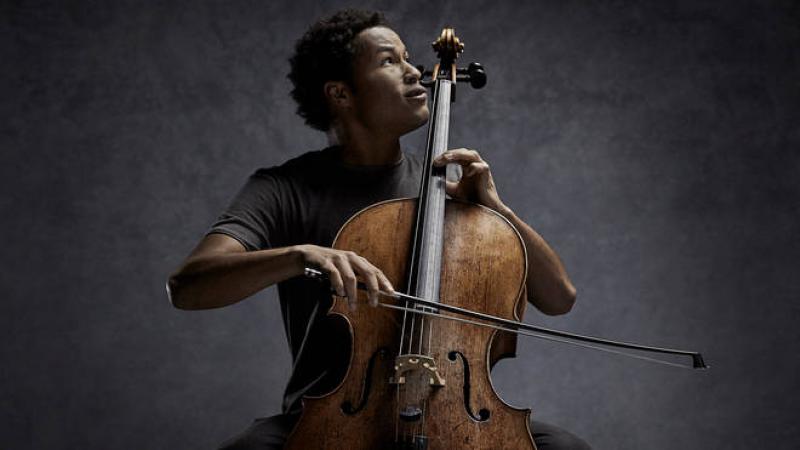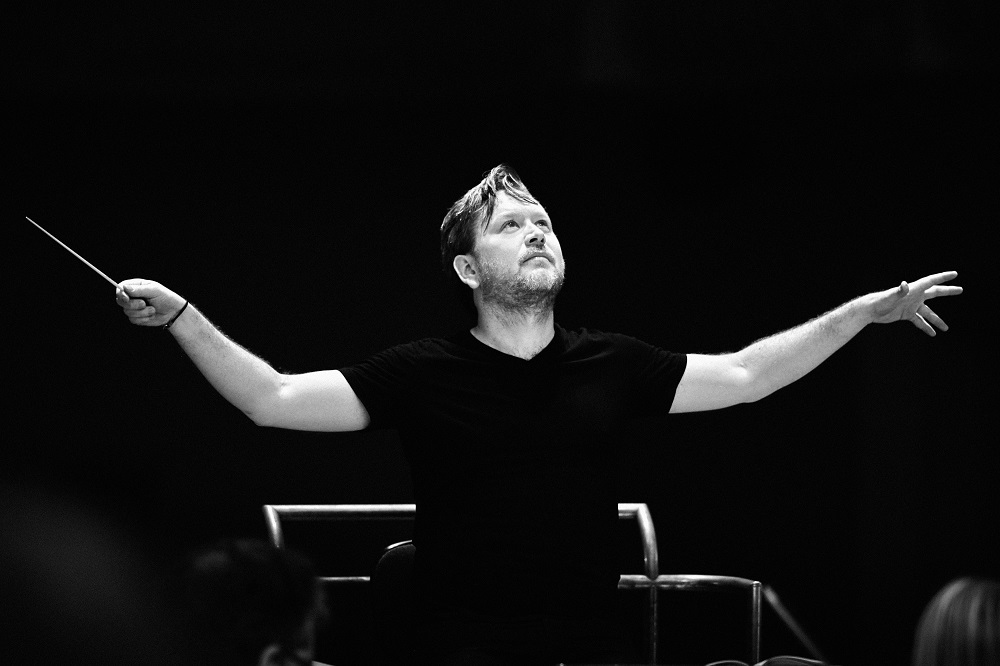Kanneh-Mason, LPO, Bloxham, Congress Theatre, Eastbourne review - stark Russian contrasts | reviews, news & interviews
Kanneh-Mason, LPO, Bloxham, Congress Theatre, Eastbourne review - stark Russian contrasts
Kanneh-Mason, LPO, Bloxham, Congress Theatre, Eastbourne review - stark Russian contrasts
Shostakovich's enigmatic Second Cello Concerto framed by Mussorgsky and Borodin

With a predictable Sheku sell-out in the hall, the context of post-Eunice clean-up and current teetering on the brink with Russia lent a strangely unsettling and salutary resonance to the programme of Shostakovich’s Second Cello Concerto framed by Mussorgsky and Borodin.
A palpable sense of coded autobiographical artistic angst, Nature, and festive celebration reflecting both truth and beauty from two different Russian centuries onto the much changed homeland and world view of present times seemed inescapable.
In Mussorgsky’s unfinished opera of political and religious intrigue Khovanshchina, the Prelude evokes sunrise over the Moscow river, which returns at the end of the work after much exile, assassination and suicide to greet the accession of Peter the Great. Natural beauty subtly underlaid with brass impressions of tolling bells and a doom-laden tam-tam suggesting a new age of Russian imperialism may not be altogether rosy were tellingly pointed in this performance.
With his career on a roll, Sheku’s choice of the second, rather than the more frequently heard first concerto of Shostakovich, was perhaps surprising. Undaunted however, he threw down a challenging gauntlet that skewered the audience as the performance probed ever deeper into the dark recesses of the composer’s enigmatic and gritty later style. The work remains predominantly bleak and sombre. The soloist’s attempts at dialogue, either by lyrical persuasion or toeing the orchestral line with sardonic humour, are persistently undermined or merely obliterated by hollow low wind registers and brusque percussion, forcefully underlined by Jonathan Bloxham’s coaxing of cumulative menace and repression from the orchestra. Come the closing bars, Shostakovich’s clocks tick on with the introspective soloist seemingly frozen forever in mind-numbing isolation. But the cello has the last word with a crescendoing single note parry of solo survival cutting through the final chord leaving the orchestra behind and brilliantly thrown off here by Sheku to crown a comprehensively intense and compelling performance. Not an easy listen when premiered in the Soviet Union of 1966, nor any easier now over half a century later, when this music assumes even more potent significance.
Come the closing bars, Shostakovich’s clocks tick on with the introspective soloist seemingly frozen forever in mind-numbing isolation. But the cello has the last word with a crescendoing single note parry of solo survival cutting through the final chord leaving the orchestra behind and brilliantly thrown off here by Sheku to crown a comprehensively intense and compelling performance. Not an easy listen when premiered in the Soviet Union of 1966, nor any easier now over half a century later, when this music assumes even more potent significance.
Making his full concert debut with the LPO in Eastbourne, Bloxham (pictured above by Kaupo Kikkas) already has considerable form locally in Sussex with his recent work at Glyndebourne, assisting Robin Ticciati with a festival revival of Dvorák’s Rusalka in 2019 as well as conducting the LPO in four performances of Verdi’s Luisa Miller there to much acclaim last year. With an impressive number of repeat invitations to many top flight orchestras in the UK, Europe and the Far East, he is also an estimable cellist, both as a soloist and in chamber works. His instrumental prowess clearly brought special empathy with Sheku in the Shostakovich concerto.
Following the interval Borodin’s Second Symphony brought the starkest of contrasts, sounding from another world, and strangely almost as far from Mussorgsky as Shostakovich. Once very popular and conducted by both Erich and Carlos Kleiber, its star has waned this century. Savouring its bold, forthright thematic material, colourful orchestration and deft rhythmic impetus, Bloxham encouraged the orchestra to relish the symphony’s primary colours with due rhetorical power and flexibility, allowing the wind principals of the LPO to shine, especially John Ryan on horn and Benjamin Mellefont on clarinet, both melting in the pre-Kismet glow of the slow movement. Special mention too for the notably agile tonguing of the entire wind and brass sections in the one-in-a-bar prestissimo Scherzo. A rousing finale set the seal of vindication on a symphony that needs no condescension.
rating
Explore topics
Share this article
The future of Arts Journalism
You can stop theartsdesk.com closing!
We urgently need financing to survive. Our fundraising drive has thus far raised £49,000 but we need to reach £100,000 or we will be forced to close. Please contribute here: https://gofund.me/c3f6033d
And if you can forward this information to anyone who might assist, we’d be grateful.

Subscribe to theartsdesk.com
Thank you for continuing to read our work on theartsdesk.com. For unlimited access to every article in its entirety, including our archive of more than 15,000 pieces, we're asking for £5 per month or £40 per year. We feel it's a very good deal, and hope you do too.
To take a subscription now simply click here.
And if you're looking for that extra gift for a friend or family member, why not treat them to a theartsdesk.com gift subscription?
more Classical music
 Kempf, Brno Philharmonic, Davies, Bridgewater Hall, Manchester review - European tradition meets American jazz
Bouncing Czechs enjoy their Gershwin and Brubeck alongside Janáček and Dvořák
Kempf, Brno Philharmonic, Davies, Bridgewater Hall, Manchester review - European tradition meets American jazz
Bouncing Czechs enjoy their Gershwin and Brubeck alongside Janáček and Dvořák
 Solomon, OAE, Butt, QEH review - daft Biblical whitewashing with great choruses
Even a top soprano and mezzo can’t make this Handel paean wholly convincing
Solomon, OAE, Butt, QEH review - daft Biblical whitewashing with great choruses
Even a top soprano and mezzo can’t make this Handel paean wholly convincing
 Two-Piano Gala, Kings Place review - shining constellations
London Piano Festival curators and illustrious friends entertain and enlighten
Two-Piano Gala, Kings Place review - shining constellations
London Piano Festival curators and illustrious friends entertain and enlighten
 Echo Vocal Ensemble, Latto, Union Chapel review - eclectic choral programme garlanded with dance
Beautiful singing at the heart of an imaginative and stylistically varied concert
Echo Vocal Ensemble, Latto, Union Chapel review - eclectic choral programme garlanded with dance
Beautiful singing at the heart of an imaginative and stylistically varied concert
 Scott, Irish Baroque Orchestra, Whelan, RIAM, Dublin review - towards a Mozart masterpiece
Characteristic joy and enlightenment from this team, but a valveless horn brings problems
Scott, Irish Baroque Orchestra, Whelan, RIAM, Dublin review - towards a Mozart masterpiece
Characteristic joy and enlightenment from this team, but a valveless horn brings problems
 Classical CDs: Voice flutes, flugelhorns and froth
Baroque sonatas, English orchestral music and an emotionally-charged vocal recital
Classical CDs: Voice flutes, flugelhorns and froth
Baroque sonatas, English orchestral music and an emotionally-charged vocal recital
 Kanneh-Mason, Britten Sinfonia, Shave, Milton Court - a grin and a big beaming smile
A pair of striking contemporary pieces alongside two old favourites
Kanneh-Mason, Britten Sinfonia, Shave, Milton Court - a grin and a big beaming smile
A pair of striking contemporary pieces alongside two old favourites
 theartsdesk at the New Ross Piano Festival - Finghin Collins’ musical rainbow
From revelatory Bach played with astounding maturity by a 22 year old to four-hand jazz
theartsdesk at the New Ross Piano Festival - Finghin Collins’ musical rainbow
From revelatory Bach played with astounding maturity by a 22 year old to four-hand jazz
 First Person: Manchester Camerata's Head of Artistic Planning Clara Marshall Cawley on questioning the status quo
Five days of free events with all sorts of audiences around Manchester starts tomorrow
First Person: Manchester Camerata's Head of Artistic Planning Clara Marshall Cawley on questioning the status quo
Five days of free events with all sorts of audiences around Manchester starts tomorrow
 Goldscheider, Brother Tree Sound, Kings Place review - music of hope from a young composer
Unusual combination of horn, strings and electronics makes for some intriguing listening
Goldscheider, Brother Tree Sound, Kings Place review - music of hope from a young composer
Unusual combination of horn, strings and electronics makes for some intriguing listening

Add comment